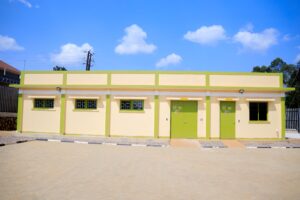As global construction and demolition (C&D) waste surpasses 25% of total waste production, the imperative for sustainable practices intensifies. Recent research underscores the pivotal role of glass recycling in demolitions, shedding light on its substantial contributions to sustainability and the evolution of circular construction.
Kate Bester, Contracts and Project Manager at Jet Demolition, emphasises the significance of a carefully engineered approach in large-scale, technically challenging projects, dispelling the misconception of demolition as merely ‘reverse construction’.
In C&D waste, recycling emerges as a potent mitigation measure to curtail landslides, lower energy consumption, offset construction industry greenhouse gas emissions, recover valuable materials, create jobs, and preserve natural resources.
Bester underscores the critical role of glass recycling during demolition, highlighting its status as an endlessly recyclable material that, despite its unique resource conservation potential, often ends up in South African landfills or as aggregate.
Efforts to achieve a 50% glass-recycling rate in the United States could divert millions of tons of material from landfills annually, significantly reducing greenhouse gas emissions. Moreover, glass recycling holds the promise of mitigating emissions from glass manufacturing, a sector responsible for at least 86 million tonnes of carbon dioxide yearly.
Bester acknowledges the challenges facing glass recycling, including safety hazards, transportation costs, and the rise of alternative materials, but underscores its continuing role in circular construction.
However, recycled glass remains a key player in circular construction. The architectural glass industry showcases the potential for a scalable circular economy by developing fire-safe building claddings using recycled glass.
This cladding offers a cost-effective, structurally robust, fire-resistant solution that can be easily recycled upon demolition, demonstrating a circular-economy solution to address a significant waste stream.
The standard glass recycling process in construction and industrial sites comprises four main steps: dismantling, collection, segregation, and treatment. These steps ensure the safe and practical removal of glass from structures, subsequent collection, segregation from other materials, and treatment to remove pollutants, making the glass ready for recycling.
Bester concludes: “Recycling glass in construction is an environmentally beneficial and crucial consideration for any demolition or refurbishment project. It plays a vital role in waste reduction, energy conservation, and carbon emission reduction.”
REFERENCES
‘Recycling of Glass from Construction & Demolition Waste’
https://www.agc-flattoflat.eu/wp-content/uploads/2017/01/Recycling-of-Glass-from.pdf
‘Sustainable Management of Construction and Demolition Materials’
https://www.epa.gov/smm/sustainable-management-construction-and-demolition-materials
‘A Circular Future for Glass’ | BCG – Boston Consulting Group. https://www.bcg.com/publications/2021/environmental-benefits-of-glass-recycling
‘Glass is the hidden gem in a carbon-neutral future’
https://www.nature.com/articles/d41586-021-02992-8
‘Recycling of construction and demolition waste and its impact on climate change and sustainable development’
https://link.springer.com/article/10.1007/s13762-021-03217-1
Ends
Connect with Jet Demolition on Social Media to receive the company’s latest news
Facebook: https://www.facebook.com/JetDemolition/?ref=br_rs
LinkedIn: https://www.linkedin.com/company/jet-demolition-pty-ltd/
Notes to the Editor
To download hi-res images for this release, please visit http://media.ngage.co.za and click the Jet Demolition link to view the company’s press office.
About Jet Demolition
Jet Demolition has been undertaking industrial demolition works since 1994, and is the leading, largest, and most technically advanced demolition company in Africa. It offers in-house, full-range demolition services, including advanced mechanical solutions and controlled implosions. It actively pursues ongoing development of skills and equipment suited to the changing needs of the industry.
Jet Demolition is a technically based company, with various staff members holding MSc, BSc, and BTech Degrees, as well as National Diplomas, in various engineering fields. This expertise gives it the technical foundation to successfully engineer solutions for large and complex demolition projects, and furthermore fuels its drive to deliver quality projects safely. Jet Demolition strives to offer its clients innovative and technical solutions to demanding demolition challenges.
Jet Demolition Contact
Kate Bester (NDip Civil Engineering – PMP)
Project and Contracts Manager
Phone: (011) 495 3800
Cell: 072 811 5310
Email: kate@jetdemolition.co.za
Media Contact
Rachel Mekgwe
NGAGE Public Relations
Phone: (011) 867 7763
Cell: 074 212 1422
Email: rachel@ngage.co.za
Web: www.ngage.co.za
Browse the NGAGE Media Zone for more client press releases and photographs at http://media.ngage.co.za
-

Jet Demolition Contracts and Project Manager Kate Bester
Recycled glass remains a key player in circular construction - Sustainable demolition practices must include glass recycling_approved
Sustainable demolition practices must include glass recycling_approved






